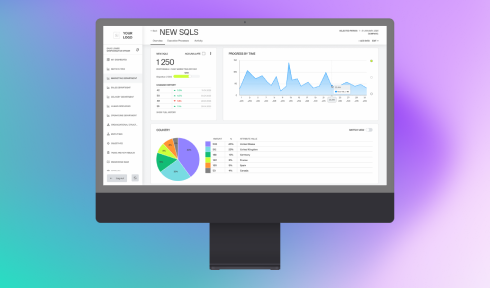What if organizations had a perfect tool to determine the cause of failures, find the best way to improve their business, and score a success much faster? Gathering large amounts of information, also known as big data, is a daily routine for many companies. Not all, however, know how to analyze this data properly as to make the best use of it. Use of the term ‘Big Data’ has soared in recent years, although the phenomenon itself already made its appearance in the early 2000s. Merging technology with strategic goals has today become more critical than ever: only in this way can business owners ensure that big data solutions meet their business needs. Below we name some successful solutions that will fit any business field.

Computools
Software Solutions
Computools is an IT consulting and software engineering company that delivers innovative solutions to help businesses unlock tomorrow. Our clients represent a wide range of industries, including retail, logistics, finance, healthcare, and others.
What is Big Data and how it Works?
The term itself is very simple. ‘Big data’ constitutes any big amount of different kinds of information that a company gathers and stores. Big data is best defined with the help of the three main characteristics:
Volume: the information can be gathered from many sources, and new technologies allow safe and rational storing.Velocity: everyday data comes in with the high speed, and businesses have to analyze it in near-real time.
Variety: the data is gathered and stored in all kinds of formats, such as texts, emails, videos etc.
So why is the proper managing and analyzing this data so important?
Analyzing it could help businesses to find answers to many important questions, such as how to reduce the time and costs that go into developing a new product or a technical solution.
But combining big data and high-powered analytics could help to resolve even bigger business-related tasks:
– determine the causes of failures;
– generate proposals in shops based on the customer’s buying habits;
– calculate all the risks within minutes;
– detect fraud before it seriously affects the company.
Well, now the importance of the big data is established, what’s next? The first step for the company is to determine the goal of big data analytics, and it starts with understanding where the data actually comes from. When the source is found, business owners need to address three basic questions.
1. Storing and managing. High-performance technologies today offer many different and safe ways to store any amount of data. There are also new reliable applications that companies could use to manage their information.
Related Experience

Computools' Product: Scaler
Systemize and scale your business with our intuitive, secure Scaler Cloud Platform - all by yourself, guided by your own business intuition and our proven methodology
2. Determining the relevancy. There are tools that allow analyzing an entire stream of data without excluding any information. However, many experts advice to determine the relevant data before analyzing it, to get a faster result.
3. Implementation. The main goal of this process is finding either a solution to a problem or a new development strategy. So the company should work out a strategy first, and then implement the solution offered after the case analysis.
The final step in making big data work for business is researching technologies and solutions that could help to make the best of big data and its analytics.
Big Data’s Potential
There is a stereotyped opinion that big data concerns big companies only. However, big data is not bound to the number of employees or terms of revenue. Hearing the term ‘Big data’ most of the small and medium companies usually imagine some industry giants. But even though the small-sized companies may not have the data analysis needs of transnational holdings, they certainly face incredible amounts of data to analyze. Even a small trade company generates invoices and marketing lists. It may also possess some type of CRM solution and thus have suspect, prospect and customer/client information stored in a database. The company would also have such financial information as receivables, payables, and general ledger. And what about all those Skype chats and logs, emails, messages, recorded videos, sent images, and documents? All of this comprises the Big Data of a company. Obviously, a small or medium organization could possess as much data as any business or industry giant, such as Microsoft or IBM, or Google or Amazon etc.
Unfortunately, most of this data is ignored. At times companies would probe for the cause of specific problems by asking, “Why did that happen?” However, very few of them use the Big Data to try and predict what will happen next. Some small companies refuse to analyze the Big Data because they don’t have enough money to spend on modern and successful solutions. And yet, high technologies could offer individual solutions to certain questions.
Smaller companies can and should also take advantage of the Big Data tools and techniques used by larger organizations. Big Data is not just for big enterprises!
Successful Big Data Solutions
Big data affects organizations across nearly all world industries. The first ones to gain the profit from analyzing the Big Data have been banks. In this field, it is equally important to understand customers and to boost their satisfaction, as well as to minimize the risks and fraud. In the field of healthcare, everything needs to be done quickly and accurately to satisfy patients as well as stringent industry regulations. Retailers need to know the best way to reach their customers as well as the most effective way to handle transactions. And this just the top of the iceberg, since Big Data offers many ways to improve a business.
Tech Industry
Tech industry is one of the fastest growing industries in the world. Some experts claim that in a few years the solutions and technologies offered by the companies in this field will completely change the world’s economy. But even now many companies are developing useful software and technical gadgets. Industry giants use Big Data analytics in order to predict customer’s needs and wants. They utilize all available information to improve their development and management and offer the best solutions on the market.
Trading and Logistics
Simple marketing research raises to a new level with the Big Data analytics. It offers big and small companies the best opportunity to learn more about customers and their needs. Effective analysis of trading company information allows predicting the next steps made by the customers and the market. This is why some organizations always remain two or even three steps ahead of their business competitors. Logistics, however, are also important. The raise of the global economy doesn’t go without creating some problems in the field of logistics. Big Data makes logistics smoother and more efficient.
Travel and Entertainment
One of the biggest challenges of Big Data is how to help a company gain customers. Travelling and entertainment are both high risks businesses. This makes collecting and storing big amounts of information even more important. The information could be used for different purposes: for predicting the market changes or researching the customers’ needs. What is more, for business owners the effective Big Data analytics pave the road to the company’s fast growth and success.
Financial Industry
In the Financial sector, the companies use Big Data to improve customer services, to minimize risk and to prevent fraud. They need reliable tools and perfect solutions that would allow them to guarantee the safety of their customers’ money and personal information. The companies also have the opportunity to prevent financial collapse and crisis. Using and analyzing the huge amount of information collected all over the world, industry giants offer the most reliable and safe solutions.
Health Care
The Global Health care system allows to predict and avoid epidemics, find the best solutions for certain regions, and save lives. The Big Data analyzing boosts the invention of new drugs and cures for various diseases. The research conducted by a group of scientists in one part of the world could be used in another project to obtain the best results. Hospitals and clinics also receive the opportunity to improve their customer service, management of the patient records, treatment plans, or prescriptions.
Retail
It has already been clarified that the Big Data can help to predict the future of the industry and its trends. For example, trend-forecasting algorithms allow retailers to study history data including previous sales, advertising, social media posts, tracking customers’ behavior. Companies make a prediction, based on these facts, and the information of what and when it is better to sell, what kind of services will be more reliable in the future, whether it is a good or bad time for investing in building resorts, hotels other entertainment objects.
Public Sector and Government
The public sector and government might stand to gain the most from using the Big Data. For example, education can be improved significantly. The analysis is used at school and universities and by the government as well. Now they can identify at-risk students, make sure students are making adequate progress, and can implement a better system for the evaluation and support of teachers and principals. Big Data analysis benefits the managing of utilities, running agencies, dealing with traffic congestion or preventing crimes.
In recent decades, the world economy has become increasingly dependent on business intelligence and well-informed decisions. This trend has stimulated the rapid development of computing technologies for collecting and analyzing data, which generate the data tsunami we witness today. The Big Data analytics is the best way to gain success in any business field or industry, improve development or customer service, predict the next step of the client or find fraud.
Have a large volume of information for your business that needs to be analyzed and regulated? Contact info@computools.com, and we’ll use the data to benefit your company.









“Computools was selected through an RFP process. They were shortlisted and selected from between 5 other suppliers. Computools has worked thoroughly and timely to solve all security issues and launch as agreed. Their expertise is impressive.”